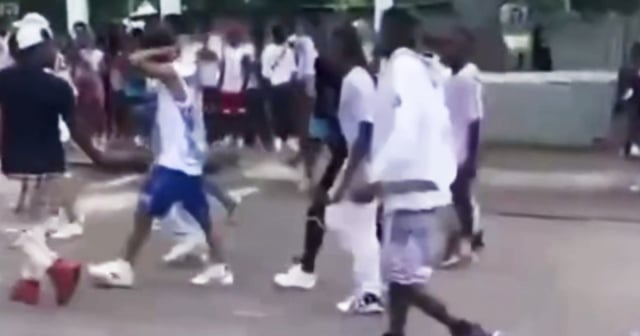Leandro Naun, a Catholic priest born in Santiago de Cuba, has witnessed up close the manifestations of violence that reflect the frustration, helplessness, and discomfort of Cubans.
The Cuban parish priest told the news portal 14 y Medio that the key lies in understanding the "repressed impotence" that Cubans have, who are capable of unleashing their anger and frustration with a machete if necessary, an example he knows very well.
One year ago, his family fell victim to aggression: three thieves wearing masks broke into his parents' house on the outskirts of Santiago de Cuba, beating his mother and striking his father with a machete.
Naun recalled that "my dad survived that attack that almost cost him his life." However, from that experience, he concluded that "violence (in Cuba) will continue to increase and is directly proportional to the frustration, helplessness, and discomfort experienced by the population."
Regarding this, he pointed out to the news portal that "it shows in people's gazes, in the harsh expressions that, even between neighbors and family members, are exchanged."
According to the cleric, "the overall mood is at rock bottom," reflecting the widespread discomfort of the citizens due to the shortage of food and medicine, as well as the annoying power outages.
Perhaps the days of parties and drunkenness are a break in the midst of so much suffering, like the days off of the Black slave on the plantation: 'How good is the master!' they said as they danced as if tomorrow did not exist. Fragile is the memory of yesterday in the poor, 14ymedio reflected.
Naun explained that reality in the mountainous areas of eastern Cuba is very different from the rest of the country.
"In places without internet access, it is another world narrated by the official press," he stated, emphasizing that in these locations it is common to experience suffering in silence and feel invaded by hopelessness."
In that context, temples are considered places for tolerance.
He also feels he has the duty to speak to everyone equally: "The head of the Federation of Cuban Women, the head of the Committee for the Defense of the Revolution, and a mother with her son imprisoned since July 11, all sit on the same bench."
In relation to the issue of migration, a phenomenon that the Catholic religion in Cuba is not exempt from, Naun explained that many priests and nuns have also fled from poverty in Cuba.
However, he does not criticize them and considered that anyone who carries the feeling of being a missionary should be able to travel.
In addition, it is believed that leaving does not free you from Cuba, pointing out that nostalgia chains the emigrant, not to mention the family that is left behind and with whom no one disengages.
However, he admitted that he admires those who have decided to stay and live in Cuba despite the pressures from the government and State Security, and mentioned Nadieska Almeida and Alberto Reyes.
They are "like voices crying out in the desert," quoting Reyes, and they also have to endure "misunderstandings from one side and the other, from one shore to the other," noted the website cited.
Every day, Naun travels through several mountain communities in Santiago de Cuba, and in his gray Toyota, he delivers food to various people, even before the supplies arrive at the store. His presence brings comfort and hope.
His daily experiences, the people he interacts with, feed a YouTube channel that serves as a form of denunciation. "Every day we must improvise, change, and redirect the path," he pointed out.
"Everything is unstable in my work environment. Everything is fragile and ephemeral like the grass in the field. Everything is dangerous: to speak, to think or to act," he remarked, highlighting the pressures he faces every day, also alluding to the human miseries he has had to witness and trying to provide hope, at the very least.
And despite everything, he stated: "There is nothing more subversive than living and being happy where many barely survive," demonstrating the optimism that always accompanies him.
It is not the first time that a Catholic priest warns about the increase in violence in Cuba, as well as its consequences.
Recently, Father Alberto Reyes from the Archdiocese of Camagüey considered that violence in Cuba is not a phenomenon that exclusively involves young people, but rather is "widespread."
In statements to Martí Noticias, the father expressed his concern about the climate of violence and tension prevailing in Cuban society following the massive brawl over the weekend at La Finca de los Monos in Havana, where six teenagers were injured, according to government statistics. "Yes, there is a very significant increase in violence. In fact, we are worried, scared (...), people no longer go out with the same confidence as before. It is a new and very worrying phenomenon. I think the youth element makes it more dramatic, but it is widespread," he emphasized.
What do you think?
COMMENTFiled under:
